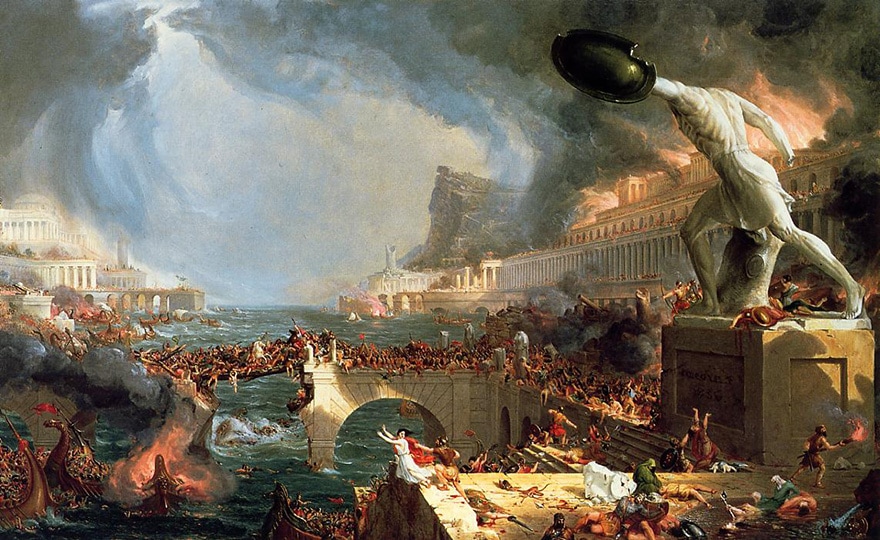The Roman Empire lasted five centuries and had a profound effect on our culture and civilization. For a long time it was believed that this Empire, seemingly indestructible, had suffered a long degradation, a decadence, until its end. However, the historians of ancient Rome are no longer wise old men, distinguished Latinists parchmenting their grimoires. No, today they call upon all the resources of today's science and technology to understand what happened nearly 2000 years ago. And their discoveries are astounding. The Roman Empire literally disappeared, with the population of Rome rising from one million to 20,000, due to climate change and epidemics rushing through the Roman Ways built throughout the known world. The Roman legionaries were not defeated by Asterix, the Barbarians or the Germans. They were struck down by the germs travelling through Roman globalisation and by the ups and downs of the climate. A story to meditate on in order to understand what could happen to us tomorrow.
L’history of the fall of the Roman Empire is known to all. The fire painters of the 19th century and the peplum Hollywood has shaped our imaginations: a people in immaculate togas speaking against a backdrop of marble columns, a decadent tyrant wallowing in baroque orgies, shaggy barbarians bursting into an exquisitely civilized world with axes and rape. And the fall. A sort of accident of history. The brutal collapse of a civilization, the end point of a slow, declining agony announced at the beginning of history. This narrative and its Epinal images served for ages is now being called into question. As in a plane crash, the opening of the black boxes sometimes holds surprises.
The Black Boxes of History
This is what historians of ancient Rome do today; they open the black boxes of history and, using the most advanced technology, try to unravel the plot and piece together the puzzle. And what they discover is very different from what was previously thought. New protagonists enter the scene of the crime; they were part of the scenery, but the importance of their role had not been measured. Climate change, disease, epidemics, all terms that are familiar to us contemporaries of an overheated world, but which hardly ever came into play to explain the tragic history of mankind.
A Harvard professor, Kyle Harper, is credited with brilliantly demonstrating the irruption of natural elements in Roman history. In his latest book How the Roman Empire collapsed... (La Découverte, 2019), he explains to us, in a scholarly text that reads like a detective novel, how climate and disease have sealed the fate of the Empire.
Today's historian is no longer alone when faced with the mysteries of exhumed ancient texts or those of fragments of life extracted from archaeological excavations. He can now use the great means available to him, particularly those offered by various modern sciences: palynology reveals the ancient plant cover thanks to pollen analysis; dendrochronology reveals the effects of climate hidden in the rings of trees and wood trunks; carpology is interested in plant remains; the technological arsenal of physical anthropology allows, in the manner of the famous forensic identification experts, to reveal the state of health of a body buried thousands of years ago. Climate science has made major advances in recent years. Thanks to them, the historian can accumulate new clues in his research: the advance of glaciers, the deposition of sediments, the distribution of isotopes in limestone concretions, the trace of volcanic eruptions in ice cores or sediments. The life sciences are opening the doors of their laboratories wide to historians: the analysis of traces of ancient DNA allows them to read the past like an open book, to discover the paths and mutations of microbes and viruses whose history is a true story in itself. Microbial agents that have their own life and their own evolution, often to the detriment of those of humans.
Narcissistic injury
This new research makes it possible to superimpose, with unprecedented precision, the chronological timeline of history with that of climate and the emergence of diseases. Correlations then appear between the historical facts dated and reported by the Ancients and hitherto neglected events. The slightest vagaries of the sun, atmospheric flows or volcanic activities result in dramatically varying crops, devastating floods, the development or extinction of animal populations, and the appearance of unknown disease vectors. All these factors explain the tragic upheavals in human history. Factors that historians, until the first half of the 20th century, totally ignored. We had to wait for the work of the American geographer Ellworth Huntington in the 1940s to suspect the importance of climate variation in historical change. The illustrious historian Fernand Braudel in its Mediterranean had noted the place of climate; but it was that of long duration, of quasi-immobility, with imperceptible evolution. It was not until the 1970s, in France, that the historian Emmanuel Le Roy Ladurie introduced climate science into historical analysis. He was the first to highlight the role of the Little Ice Age between the late Middle Ages and the modern period. But he did so cautiously, fearing that he would be accused of the crime of determinism.
Kyle Harper has passed this point. He's not afraid of inflicting a new narcissistic wound on humanity. Galileo had expelled us from the centre of the Cosmos, Darwin from the summit of creation, and Freud had thrown our existence as subjects into turmoil. Here we are once again put in our place: the history of mankind has been constructed with actors other than man himself. The germs and the vagaries of the climate have their part in our history, and it is a major one. When the Goths entered Rome on August 24, 410, they massacred a few thousand inhabitants; when they entered Rome, the plague virus and the malaria-carrying mosquito devastated almost the entire population of the Eternal City.
For a long time it was believed that the fall of Rome was the inevitable effect of the excesses of its greatness. What Harper's book reveals is that " the fall of the Empire was also the triumph of nature over human ambitions... ». The author states: " Rome's destiny was played out by emperors and barbarians, senators and generals, soldiers and slaves. But it was also decided by bacteria and viruses, volcanoes and solar cycles. ".
In search of a global world
The Romans built their Empire by wanting to enslave Nature. Nature turned against them. The Roman roads that innervated the Empire and which were raved about in our history books allowed Roman culture and trade to grow and conquer hitherto inaccessible lands. During the Roman period, there was a quantum leap in global connectivity. The Romans sought silk and spices, slaves and ivory, fuelling a frenetic movement across borders. Merchants crossed the Sahara, crossed the Indian Ocean, and headed north... The paths of the Empire all started in Rome, always returning to Rome.
But at the same time, Roman "globalization" allowed diseases to circulate and flourish. By conquering Egypt to make it their granary and feed the Empire with wheat, the Romans also let rats into Rome and the plague spread. By building palaces, forums and other temples that made the splendour of the Empire and, in many ways, the Eternal City, the Romans deforested entire hills, turned what were once woods into swamps, multiplied fountains and canals allowing mosquitoes to settle and malaria to flourish. « In many ways, an unexpected and paradoxical consequence of the ambitious Roman social development has been to foster a lethal microbial environment. ». The author continues: « Unintentionally, the Romans were complicit in the establishment of the ecologies of disease that haunted their demographic regime. ".
The Romans wanted to build a global world in which mastery of nature was ultimately an illusion. A story that is singularly familiar to us today.
Contemporary Echoes
The collapse of the Roman Empire has many contemporary echoes. Is it the effect of the prosperity still sought by men? Is it the expression of its immense fragility? Is it the historical proof of the planet's limits and those of the living? Collapse is not a view of the mind but a very real possibility that does not only concern past or distant civilizations.
The history of the Romans has enchanted us since antiquity. It has nourished most of the Arts as well as our collective unconscious. It also moves us because we see better now how pathetic the Romans were, " balancing on the invisible razor's edge of a change they didn't know about. ".
That the environment has played such a role in making and breaking the history of one of the most remarkable civilizations should be a source of inspiration to us. « Rome is almost inevitably a mirror and a measuring instrument... " writes Harper. But it should not be used as an illustration of a dead civilization. The history of Rome is important as a work in progress. It is not the end point of an ancient lost world; it could be the beginning of a drama that is being played out right now.

Kyle Harper, How the Roman Empire collapsed...La Découverte, 2019, 544 p, 25 euros
Anything to add? Say it as a comment.













Obviously, the reference to the Roman Empire is illuminating. Every civilization, as it develops, creates the instruments of its downfall, in addition to the vagaries of climate and plate tectonics. Morally first of all, comfort creates soft people, reluctant to fight and make efforts, requiring the services of immigrants for labor and mercenaries for the country's defense. Trade carries pathogens, which proliferate in the population most debilitated by consumer diseases. Add a climatic element to the mix, and things can fall apart. Bad weather brings… Read more "